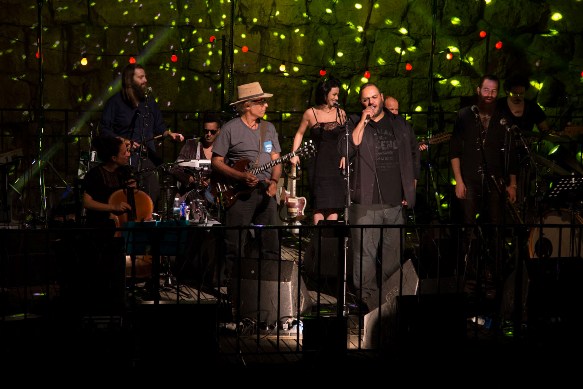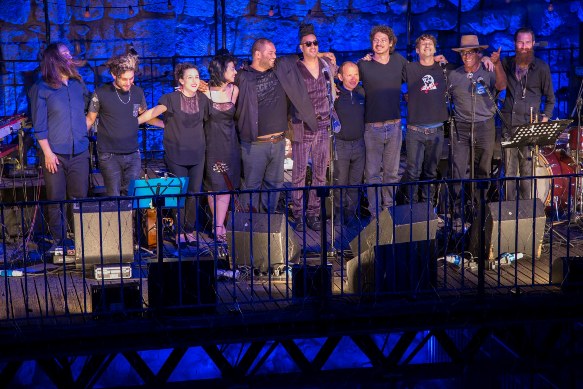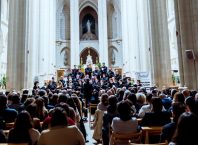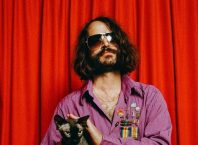
Badad – it’s somehow more solitary than levad, the other Hebrew word that means alone. It resonates with the sound of the eternal, the essential, describing someone who is not just temporarily alone, but set apart from others in the core of his being, someone who will always be beyond reach. Zohar Argov (1955 – 1987) was known as the King of Mizrahi music, his songs reached out beyond the confines of genre to redefine the way people listen to music in Israel, bringing Mizrahi/Middle Eastern music into the mainstream. Yet so many of these songs are the cry of a lonely heart, a tortured soul who has lost all, without prayer, without song; yet he prays, he sings. He did not compose the music or write the lyrics, but in singing, he made the songs his own. Zohar Argov’s song is pain and desire, distilled, transformed into art, and that is the secret of its endurance.
When Zohar Orkabi began his musical career, he was advised to change his name to something that will have a more familiar ring to what was at that time the predominantly European mainstream. He chose Argov, a name associated with the very European roots of the Israeli song canon, and with his song, nurtured by Yemenite roots and Sephardic liturgical traditions, Zohar Argov set hearts on fire.
The Israel Festival 2015 premiered Badad, an evening that dances to the rhythms of the revolution we have seen in Israeli music since Zohar Argov’s time, produced and artistically directed by Chaim Shemesh, under the musical direction of Rea Mochiach, performed by an amazing supergroup of Israeli singers and musicians: Ninet Tayeb, Ravid Kahalani, Shai Tsabari, and the Rea Mochiach Ensemble – Adam Sheflan (electric and bass guitar), Gershon Waiserfirer (trombone and oud – this is as good a time as any to say, watch this musician, he is sensational!), Hod Moshonov (keyboards), Tom Mochiach (guitar), and ensemble guest Avishai Cohen (trumpet), with special guest Yehuda Keisar on electric guitar. One might be tempted to call it a tribute to Zohar Argov, but it was so much more.

It was an evening in search of Zohar Argov, reaching out through music to understand the man and the performer, the places where those at times conflicting identities converge. In these arrangements, we understand Argov through a meticulously wild and diverse contemporary musical language that enjoys the freedom to respect and celebrate that which was excluded and outcast in our cultural past, and the freedom to explore its possibilities, the places where jazz meets rock, and layers of electronic sound meet Middle Eastern instruments and traditions. In listening to this music, we come to know and understand ourselves.
The powerful performance was enhanced by the onstage presence of the performers throughout the evening, creating a sense of community, something shared that is more than a show. But it was a tremendous show, a night to remember, music set like a jewel in a unique frame: the Tower of David. Sitting in the courtyard surrounded by fortress walls, the Jerusalem stones so ancient they almost transcend time, the music let us experience past and present at once, with intimations of the future.
Ninet began the evening uncharacteristically at the drums, with a wail leading into a lament for lost love – Elinor (lyrics: Jacky Mekaiten; music: Stelios Kazantzidis). Shai Tsabari sang Od Daka At Ne’Elemet (In One Moment You Will Be Gone – music & lyrics: Rami Lev) to a very cool jazzy arrangement, one that floated so easily, almost too breezy, as if conserving strength for what was yet to come. And what lay ahead did not disappoint.
At Li Layla (lyrics: Yoel Gov Arie & Boaz Sharabi; music: Boaz Sharabi) is a beautiful song that has been covered many times, but hearing Shai Tsabari that night I felt as though I was hearing the song for the first time. Tsabari has a voice full and wide enough to embrace the world, but when he takes it in, deep and introspective, almost as though he is alone, singing into his own soul, the impact is so powerful it hurts: “I have nothing/not even songs.”
Yet neither Zohar Argov nor Rea Mochiach abandon us to this dark place, Argov’s songs illuminate the darkness with recognition and understanding, the richly textured musical arrangements dance and soar high above. Ravid Kahalani in pinstripe suit and dreadlocks twisted high around his head sang out Nachon LeHayom (Right for Today – lyrics: Shaul Ben Shaul; music: Avner Gadasi), Zohar Argov’s Yeminite roots reverberating in the ornate swirls of Kahalani’s voice.
Maya Belsitzman broke my heart on Ad Matai Elohei (Until When My God – lyrics: Uzi Hitman; Turkish melody), singing the breath of a prayer a capella, into an abyss of night. Merging her voice with the cello, she possesses a musicality that enthralls, expressing the most tender moment, and the amplified rage of a rebellious spirit. Together with Shai Tsabari, Belsitzman took Einayich HaHumot (Your Brown Eyes – lyrics: Suzy Sarenga; Greek melody) to a complex, textured rock madness heightened by Tsabari’s piercing falsetto.
Just as crucial is knowing when to let the song come through with a measure of simplicity, and these were lovely – from Ma Lach Yalda (lyrics & music: Moshe Nagar) sung by Ninet with Maya Belsitzman; Et Dodim Kala (lyrics: R. Hayim Ben Sahal; music: folk) in very traditional by Shai Tsabari with the surprise of Yehuda Keisar (who was in The Sounds of the Oud, the band that gave Argov his first chance onstage), who jammed with Hod Moshonov; Od Yom Yavo (lyrics: Yoram Tahar Lev, music: Avraham David HaCohen) featuring Ravid Kahalani with Yehuda Keisar. People were dancing and all was right with the world.
Yes, it all led up to an incredible dramatic finish: Ninet singing what became her breakthrough song Yam Shel Dmaot (A Sea of Tears – lyrics: Zmira Chen, music: Rafi Gabay), and then Badad (Alone – lyrics: Amshi Levin, music: Uzi Melamed), with HaPerach BeGani (The Flower in My Garden – lyrics: Avihu Medina, music: Medina & Moshe Ben Mosh) and Sod HaMazalot (Secrets of the Zodiac – lyrics: Avihu Medina, music: Medina & Moshe Ben Mosh) as an encore. A dazzling free jazz jam and hardcore Middle Eastern popular Argov mashup – perfect! This is precisely the kind of cutting edge, culturally significant production that one expects to discover at the Israel Festival – Bravo! All that remains is to wait for the album…
Yet for me, one of the night’s most beautiful, poignant moments came just before the rising crescendo of the finale, when Maya Belsitzman sang Al Nevakesh (Let Us Not Ask – lyrics: Tami Levy, music: Moshe Nagar). Singing almost entirely a capella, fingers barely touching the cello, the words emerging from the deepest caverns of the soul: “There are things hidden from us/we will not understand nor know/we will also do things/that seem to be without reason/not everything/needs to be questioned and explored/sometimes we can allow ourselves/not to know everything.” Ninet sang with her, Adam Scheflan accompanied on guitar, and out there, in the darkness, the man with white hair who sat in the row ahead of me, quietly, so that only those very close to him could hear, sang the whole song from beginning to end.





